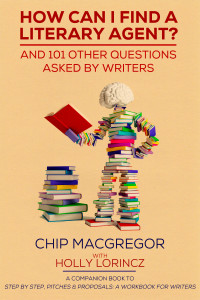Ask the Agent: How can I know if this is the agent for me?
I’ve recently had a bunch of agenty questions cross my desk…
I understand the need to sell an agent on me and my work, but I also want an agent who I can work with long term. At what point in the process is it appropriate for me to explore if we are compatible? I’d hate to sell an agent on a proposal and then need to turn him or her down.
But that happens all the time. It’s why I encourage authors to research agents, talk to them if at all possible, and see if the two of you are a fit. This is in many ways a business partnership, so you don’t want to be linked up with someone you don’t like, or don’t trust, or you just don’t feel on the same page with. Think of it this way: You don’t want to start a business with someone you have doubts about; you don’t want to be seeing a doctor that you don’t believe knows what he is doing; you don’t want to invest money with a fund manager you feel may be incompetent. This is why I frequently tell authors that I’m not the agent for everybody – writers sometime will hear me speak at a conference and think I’m the guy they want as an agent, but if we haven’t met and talked, I may be exactly the wrong type of match for them.
So what to do? First, make sure you know what YOU need in an agent. Second, take some time to research the agents you’re talking to. Third, get a chance to talk with the agent for longer than a ten minute pitch session, so you can find out what he or she is like. Fourth, if at all possible, get a chance to meet the agent face to face, so you really get a feel for strengths, weaknesses, personal style, and match.
How important is location when selecting an agent? I’ve been told by some authors that it’s best if your agent is in NY, where they can casually trade info over drinks. Yet I’ve seen a number of agents who seem excellent except they are located in North Carolina or California. How important is it really to be in the hub of the Big Apple?
I hear this all the time – “You can’t really make a living as an agent unless you’re in New York.” Uh-huh. I used to be an associate publisher with a New York-based publishing house. Over the past eight years, I’ve done more book deals than any other agent in the US. And I live on the Oregon coast. Jane Dystel has done the next most. She lives in California. Natasha Kern has done the next most. She lives in Washington state. Laura Bradford is probably in the top five or six. She lives in San Diego. So does Sandy Dijkstra. Roberta Brown lives in Florida. Steve Laube lives in Phoenix.
Look, I’m not saying that spending time in New York isn’t important – I go back a few times each year, so I can be face to face with editors and keep the relationships fresh. But the days of wandering around the city and having three martini lunches on a regular basis? They’re done. There are great literary agencies in New York – Foundry, Trident, Inkwell, Writers House, DeFiore, Janklow and Nesbit, Greenburger, Danny Baror, etc. But there are great literary agents spread all over the country. Living in New York has not kept me from staying busy and being successful at this job.
How important is the size of the agency? Many of the agents I’m looking at seem great, however they have a staff of two or three. What happens when an agent has a personal crisis, death in the family or coma-inducing fifty-car pileup? Who takes up the slack in a tiny agency? Is it better to go mid-size or are my concerns unrealistic?
A great question. Disasters can happen with anyone, and if your agent suddenly faces problems, it can slow things down for you. But I’ve found that publishers tend to be understanding – I went through this situation several years ago when my mom had her stroke (and passed away a few days later). Obviously, stuff with most writers and publishers took a back seat while I was dealing with hospitals and funeral homes. Everyone was accommodating and understanding. The fact that I was working for a multi-person agency might have helped a bit, but not much, since other agents didn’t really have much contact with the authors I represented. There are several other agents working at MacGregor Literary, and I’m sure they’d all step in to assist if I were hit by a bus… though their knowledge of the authors and projects would be limited. Perhaps this could be a concern at a one-person agency, since there is nobody to help pick up the slack.
=========================
Hey, do you have a question you want to ask a literary agent? You can send it to me at Chip (at) MacGregor Literary (dot) com. OR you could pick up a copy of my new book — How can I find a Literary Agent? (and 101 other questions writers ask), hot off the presses from The Benchmark Press. Find it in print or as an ebook at Amazon.com.


